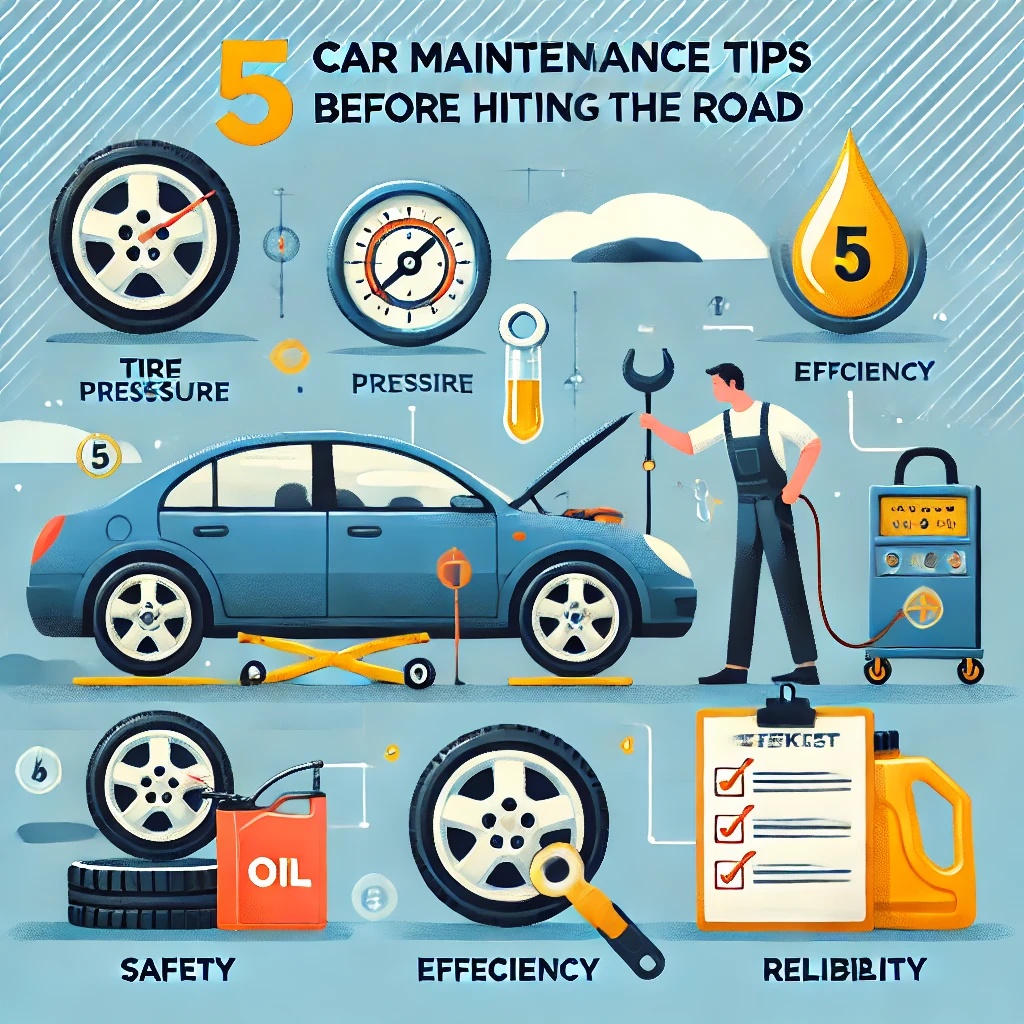5 Tips for Maintaining Your Vehicle Before Hitting the Road

Before hitting the road, taking care of your vehicle is essential for enhancing your safety and ensuring that your journey is smooth and enjoyable. A well-maintained vehicle can significantly reduce the risk of breakdowns or accidents. Here are 5 essential tips to help you maintain your vehicle before traveling:
1. Check the Condition of Your Tires
Tires are one of the most important aspects of road safety. Before leaving, ensure that your tires are in good condition. Here’s what to check:
- Tire Pressure: Proper tire pressure not only improves fuel efficiency but also enhances your vehicle’s grip on the road. Regularly check tire pressure according to the manual.
- Tire Tread Depth: The depth of the tire tread is crucial, especially in rainy conditions. Insufficient tread depth increases the risk of slipping and hydroplaning. Replace the tires if the tread depth is below the safe limit.
- Damage Check: Inspect for cracks, cuts, or any damage to the tires. If you find any issues, replace the tire.
2. Review Oil and Fluid Levels
There are several fluids that your vehicle needs to run efficiently, from motor oil to coolant. Before your journey, make sure the fluid levels are correct:
- Engine Oil: Engine oil is critical for the engine’s proper function. If oil levels are low, your engine could overheat and get damaged. Check the oil level and add more if necessary.
- Coolant: Coolant prevents your engine from overheating. A low coolant level can lead to engine damage. Check the coolant level and top it off if needed.
- Brake Fluid and Other Fluids: Also check brake fluid, steering fluid, and other essential fluids. Low fluid levels can affect your vehicle’s performance.
3. Check Your Brake System
Brakes are one of the most critical safety features of your vehicle. Before heading out, make sure your brake system is functioning properly:
- Brake Pedal Check: Inspect whether the brake pedal feels soft or hard. A soft pedal may indicate low brake fluid. A hard pedal might suggest a problem with the brake system.
- Brake Pads Check: Check the brake pads for wear. Worn pads reduce brake performance and compromise safety. Replace them as soon as possible if they are worn out.
- Brake Noise: If you hear unusual noises when braking, it could indicate an issue with the brake pads or discs.
4. Inspect Lights, Signals, and Other Electrical Components
It’s essential to be aware of your surroundings for safe driving. Make sure all lights, signals, and warning lights are working:
- Headlights and Indicators: Ensure that your headlights, both high and low beams, are functioning correctly. Also, check that your turn signals are working properly.
- Brake Lights: Verify that the brake lights are functioning. These lights are crucial for making sure other drivers can see when you are slowing down.
- Other Lights: Make sure reverse lights, parking lights, and other vehicle lights are in working order.
5. Check Your Battery Condition
The battery is one of the most important components of your vehicle. Checking its condition before a long trip can prevent unexpected breakdowns:
- Battery Connections: Ensure the battery terminals are clean and secure. If there is corrosion, clean it off.
- Battery Charge: If the battery charge is weak, have it charged before heading out. If it’s completely drained, it may need to be replaced.
- Age and Condition: Car batteries typically last 3 to 5 years. If your battery is old, consider replacing it.
Conclusion
Maintaining your vehicle before hitting the road enhances safety and makes your journey smoother. By checking the tires, fluid levels, brake system, lights, and battery, you can prevent potential issues and enjoy a trouble-free trip. Remember, taking small maintenance steps can prevent major problems. Don’t neglect vehicle maintenance for a safer and more enjoyable journey!










